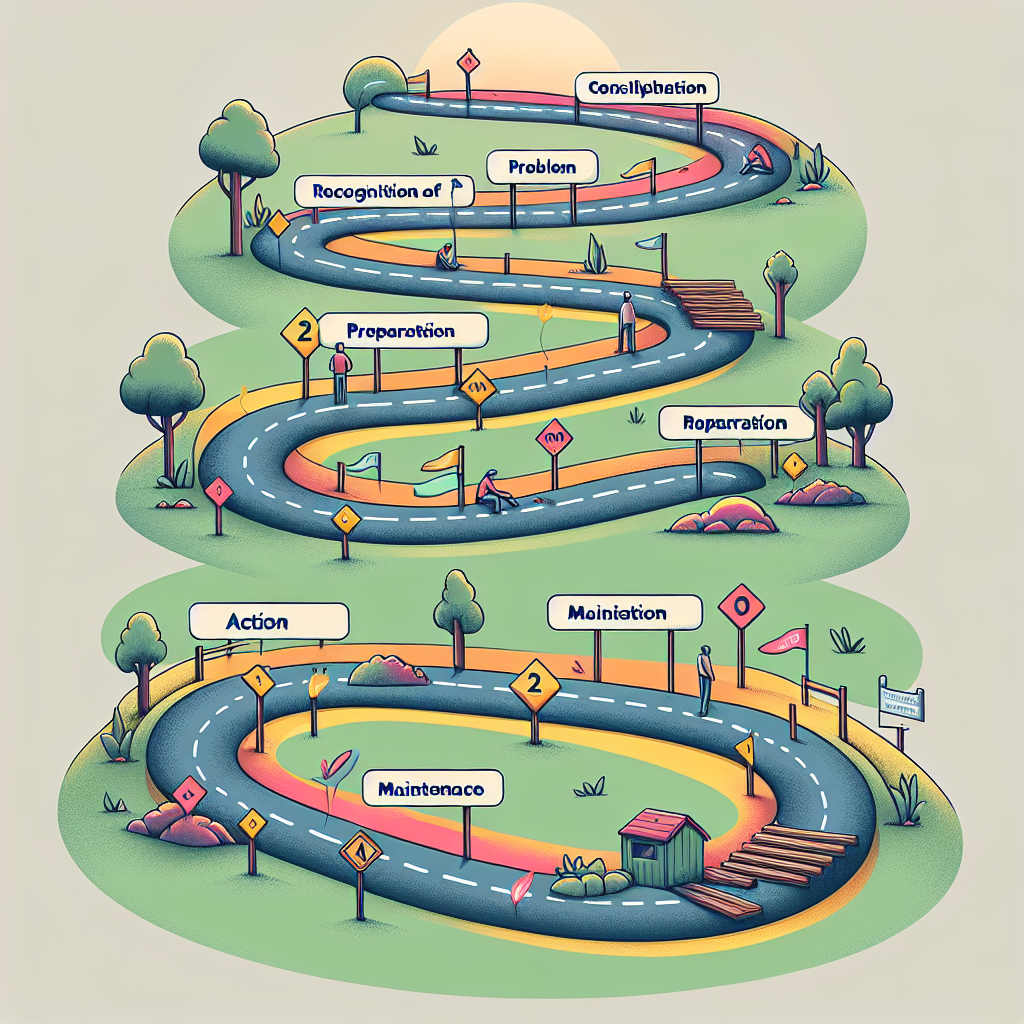-
Table of Contents

“Navigating the Path: Embracing Every Stage of Addiction Recovery”
Introduction
Understanding the Different Stages of Addiction Recovery
Addiction recovery is a multifaceted process that involves a series of stages, each characterized by unique challenges and milestones. Recognizing and understanding these stages is crucial for individuals seeking to overcome addiction, as well as for their families, friends, and healthcare providers who support them. The journey from addiction to recovery is not linear; it often involves setbacks and requires a comprehensive approach that addresses the physical, psychological, and social aspects of the individual’s life. By gaining insight into the different stages of addiction recovery, one can better appreciate the complexities of the process and the resilience required to achieve lasting sobriety. This understanding also fosters empathy and provides a framework for developing effective treatment plans that are tailored to the specific needs of each individual.
Exploring the Initial Stages of Addiction Recovery: Detoxification and Early Abstinence
Understanding the Different Stages of Addiction Recovery
Exploring the Initial Stages of Addiction Recovery: Detoxification and Early Abstinence
Embarking on the journey of addiction recovery is a courageous and transformative endeavor. The initial stages, detoxification and early abstinence, are critical in laying the foundation for long-term sobriety. These stages, though challenging, are essential for breaking the physical and psychological chains of addiction, and they mark the beginning of a new chapter filled with hope and possibility.
Detoxification, often referred to as detox, is the first step in the recovery process. It involves the elimination of toxic substances from the body, a process that can be physically and emotionally taxing. During this phase, individuals may experience withdrawal symptoms, which can range from mild discomfort to severe physical and psychological distress. The intensity and duration of these symptoms depend on various factors, including the type of substance used, the duration of addiction, and the individual’s overall health. Despite the challenges, detoxification is a necessary step to cleanse the body and prepare it for the subsequent stages of recovery.
Transitioning from detoxification to early abstinence is a significant milestone. Early abstinence is the period when individuals begin to adjust to life without the substance they were addicted to. This stage is often marked by a heightened awareness of the triggers and cravings that can lead to relapse. It is during this time that individuals must develop new coping mechanisms and strategies to manage these challenges. Support from healthcare professionals, counselors, and support groups can be invaluable in navigating this phase. The encouragement and understanding from those who have walked a similar path can provide the strength and motivation needed to stay committed to recovery.
One of the key aspects of early abstinence is learning to recognize and avoid triggers. Triggers can be anything from certain people, places, or situations that evoke memories or feelings associated with substance use. Developing a keen awareness of these triggers and creating a plan to avoid or cope with them is crucial. This might involve making significant lifestyle changes, such as avoiding social gatherings where substance use is prevalent or finding new hobbies and activities that promote a healthy and sober lifestyle.
Another important element of early abstinence is building a support network. Surrounding oneself with positive influences and supportive individuals can make a significant difference in maintaining sobriety. This network can include family members, friends, support groups, and healthcare professionals. Engaging in regular therapy sessions, whether individual or group, can provide a safe space to explore underlying issues that may have contributed to the addiction and to develop healthier ways of thinking and behaving.
As individuals progress through early abstinence, they often experience a renewed sense of self and a growing confidence in their ability to lead a sober life. This stage is not without its challenges, but each day of sobriety is a testament to their strength and resilience. Celebrating small victories and acknowledging progress, no matter how minor it may seem, can reinforce the commitment to recovery and inspire continued efforts.
In conclusion, the initial stages of addiction recovery, detoxification and early abstinence, are pivotal in setting the stage for a successful journey toward long-term sobriety. While these stages are fraught with challenges, they also offer opportunities for growth, self-discovery, and the rebuilding of a healthier, more fulfilling life. With determination, support, and a willingness to embrace change, individuals can overcome the hurdles of early recovery and move forward with hope and confidence.
Navigating Long-Term Recovery: Strategies for Maintaining Sobriety and Preventing Relapse
Navigating long-term recovery from addiction is a journey that requires dedication, resilience, and a well-thought-out strategy. Maintaining sobriety and preventing relapse are critical components of this journey, and understanding the different stages of addiction recovery can provide valuable insights into how to achieve these goals. The process of recovery is not linear; it involves various phases, each with its own set of challenges and opportunities for growth. By recognizing these stages and employing effective strategies, individuals can enhance their chances of sustaining long-term sobriety.
Initially, the early stage of recovery is often marked by a sense of relief and optimism. This period, sometimes referred to as the honeymoon phase, is characterized by the newfound freedom from the substance that once controlled one’s life. However, this stage also requires vigilance, as the risk of relapse is high. Developing a strong support network is crucial during this time. Engaging in therapy, attending support group meetings, and building relationships with others who understand the journey can provide the necessary encouragement and accountability.
As individuals progress into the middle stage of recovery, they may encounter a range of emotions and experiences. This phase often involves addressing the underlying issues that contributed to the addiction. It is a time for introspection and personal growth. Strategies such as cognitive-behavioral therapy (CBT) can be particularly effective in helping individuals identify and change negative thought patterns. Additionally, developing healthy coping mechanisms, such as exercise, meditation, and creative outlets, can provide alternative ways to deal with stress and emotional triggers.
Transitioning into the later stages of recovery, individuals often find themselves more stable and confident in their sobriety. However, this does not mean the journey is over. Long-term recovery requires ongoing effort and commitment. One effective strategy for maintaining sobriety is to set realistic and achievable goals. These goals can provide a sense of purpose and direction, helping individuals stay focused on their recovery. Moreover, continuing to engage in support groups and therapy can offer ongoing guidance and reinforcement.
Preventing relapse is an essential aspect of long-term recovery. Understanding the common triggers for relapse, such as stress, social situations, and emotional distress, can help individuals develop proactive strategies to avoid them. Creating a relapse prevention plan, which includes identifying warning signs and having a list of supportive contacts, can be a valuable tool. Additionally, practicing mindfulness and staying present in the moment can help individuals manage cravings and avoid falling back into old habits.
Another important strategy for maintaining long-term sobriety is to cultivate a balanced and fulfilling life. This involves finding joy and satisfaction in various aspects of life, such as work, relationships, hobbies, and personal growth. Building a life that is rich and meaningful can reduce the temptation to return to substance use. Furthermore, giving back to the community, whether through volunteering or mentoring others in recovery, can provide a sense of purpose and connection.
In conclusion, navigating long-term recovery from addiction is a multifaceted process that requires ongoing effort and dedication. By understanding the different stages of recovery and employing effective strategies, individuals can enhance their chances of maintaining sobriety and preventing relapse. Building a strong support network, developing healthy coping mechanisms, setting achievable goals, and cultivating a balanced life are all essential components of this journey. With resilience and commitment, long-term recovery is not only possible but can lead to a fulfilling and meaningful life.
Q&A
1. **Question:** What are the initial stages of addiction recovery?
**Answer:** The initial stages of addiction recovery typically include precontemplation, contemplation, and preparation. In the precontemplation stage, individuals may not yet recognize their addiction. During contemplation, they begin to acknowledge the problem and consider the possibility of change. In the preparation stage, they start planning and taking small steps toward recovery.
2. **Question:** What is the significance of the maintenance stage in addiction recovery?
**Answer:** The maintenance stage is crucial in addiction recovery as it involves sustaining the progress made during the action stage. Individuals work to prevent relapse by continuing to practice coping strategies, maintaining a healthy lifestyle, and seeking ongoing support. This stage can last for years and is essential for long-term recovery success.
Conclusion
Understanding the different stages of addiction recovery is crucial for providing effective support and treatment. The stages typically include precontemplation, contemplation, preparation, action, maintenance, and sometimes relapse. Each stage represents a different level of awareness, readiness, and commitment to change. Recognizing these stages helps tailor interventions to meet the individual’s current needs, thereby enhancing the likelihood of successful recovery. Comprehensive support that addresses physical, psychological, and social aspects is essential throughout the recovery process to foster long-term sobriety and well-being.



